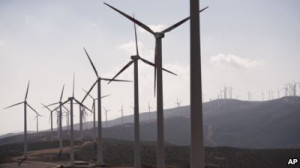Voice of America
Kim Lewis

Wind farms like this array of turbines near Tangiers, Morocco, present a renewable energy alternative to traditional sources of electricity in Africa.
The Millennium Challenge Corporation, MCC, recently announced a $70-million commitment to bring one billion dollars in public-private investments to developing countries over the next five years.
A large portion of the grant money will go to Africa and is expected to generate $750 million in investments in Africa from the private sector.
“MCC is typically going to invest in large-scale infrastructure projects,” said Kyeh Kim, Deputy Vice-President of Compact Operations for the MCC. “It’s about two-thirds of our portfolio.
“Within the infrastructure portfolio we will help prepare some of the projects for the market such that private companies would find them attractive and be interested in investing along-side some of these projects.”
The anticipated result would be public private partnerships that increase the effectiveness of the operation and the maintenance of the investments.
“An example of this would be something that we did in Jordan with the waste water treatment plant, where MCC came in with about $93-million dollars in grant financing and we were able to partner with a private sector consortium that contributed about $110 million. And so with over $200-milllion we were able to expand a waste water treatment plant providing increased water supplied to the Jordanians,” explained Kim.
Similar infrastructure projects are taking place in Africa. The MCC is investing heavily in the continent’s energy sector.
The deputy vice-president said pre-existing compacts and future compacts of $52 million will be invested in Malawi, Benin, Lesoto, Liberia, Tanzania, Ghana and Morocco. “There are other countries that we are investing as well and those countries that I just listed probably have the largest opportunities for public-private partnerships.”
The ultimate goal of these partnerships is to reduce poverty, increase economic growth and attract more investors. Kim said the partner countries are already taking steps to make their countries more attractive to meet these challenges.
“These are countries that have a good track record in terms of good governance and democracy, have made strong efforts toward anti-corruption and are investing in their social sectors and education and health, as well as creating an enabling business environment through things like good fiscal policy, trade policy,” Kim said.
“For example, as I mentioned we are invested quite heavily in the energy sector,” she said. “We are part of the U.S. Government Power Africa initiative — committing about $2 billion to that initiative in the countries where we work. For example, in Benin, they’re working very hard to modernize their policies to allow for more private sector investment to strengthen the utility companies so that they perform better for their customers and are also financially viable.”
Kim is optimisitic that African countries can make tremendous progress over the next five years to overcome poverty if they continue to work to keep their countries attractive to investors.
“I’m a 100 percent optimist when it comes to Africa. When you hear that about six out of the 10 fastest-growing economies in the world are in Africa, I think that there’s tremendous growth opportunity there. So I see in five years definitely much more interest by the private sector from countries that traditionally have not invested in Africa and what we’re trying to do is increase the visibility of U.S. companies in Africa,” said Kim.







